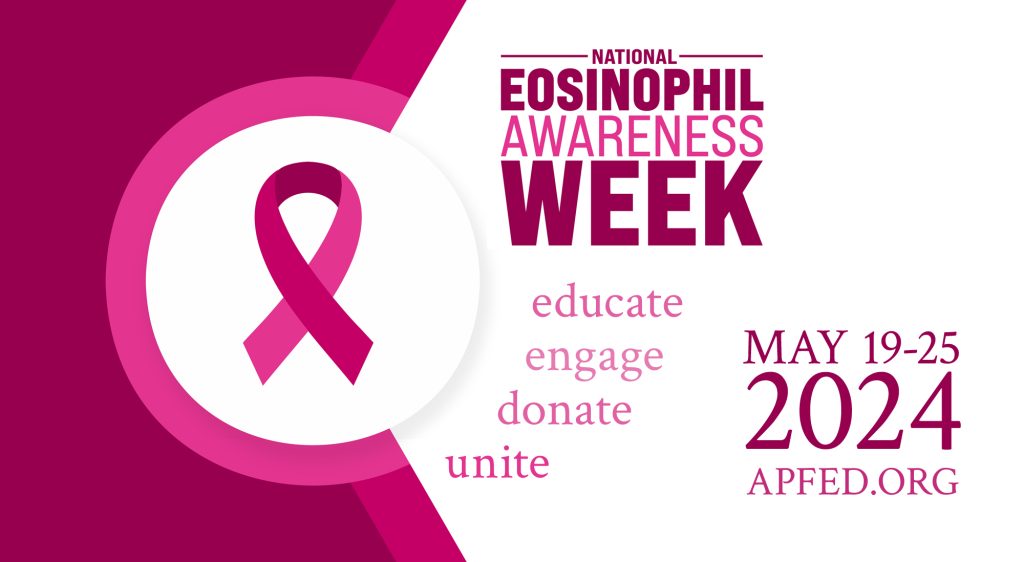National Eosinophil Awareness Week is May 19-25, 2024 focusing on eosinophil-associated diseases. The U.S. House of Representatives passed House Bill 296 in May 2007 forever recognizing the third week of May as National Eosinophil Awareness Week (NEAW). AAFA joins the American Partnership for Eosinophilic Disorders (APFED) this week to focus on awareness about eosinophil-associated diseases.
Eosinophilic Esophagitis (EoE) is a condition where your esophagus gets inflamed and can narrow over time. This narrowing can lead to a variety of daily symptoms, like painful and difficult swallowing, food getting stuck, and chest pains. EoE causes swelling in your esophagus. The esophagus is in the upper part of the gastrointestinal (GI) tract (gut) and is the tube that moves food from your mouth to your stomach when you swallow. EoE may potentially result from an immune response to food. In some cases, environmental allergens (such as pollen, mold, dust mites, etc.) can also trigger EoE. AAFA.ORG
Eosinophilic (Eos) asthma is a subtype of asthma that is often severe. It is commonly seen in people who develop asthma in adulthood, although it may occur in children and young adults. In eosinophilic asthma, the numbers of eosinophils are increased in blood, lung tissue, and mucus coughed up from the respiratory tract (known as sputum). The whole respiratory tract is involved in airflow obstruction from the sinuses to the small or distal airways. Patients with Eos asthma frequently suffer from chronic sinus disease and nasal polyposis. Research has also shown that an elevated number of eosinophils in the blood correlates with future risk and severity of asthma attacks. APFED.ORG
WHAT CAN I DO? Visit the APFED website for ideas to educate, donate, unite, engage and help those with eosinophil-associated diseases.
Eosinophilic Esophagitis (EoE) is a condition where your esophagus gets inflamed and can narrow over time. This narrowing can lead to a variety of daily symptoms, like painful and difficult swallowing, food getting stuck, and chest pains. EoE causes swelling in your esophagus. The esophagus is in the upper part of the gastrointestinal (GI) tract (gut) and is the tube that moves food from your mouth to your stomach when you swallow. EoE may potentially result from an immune response to food. In some cases, environmental allergens (such as pollen, mold, dust mites, etc.) can also trigger EoE. AAFA.ORG
Eosinophilic (Eos) asthma is a subtype of asthma that is often severe. It is commonly seen in people who develop asthma in adulthood, although it may occur in children and young adults. In eosinophilic asthma, the numbers of eosinophils are increased in blood, lung tissue, and mucus coughed up from the respiratory tract (known as sputum). The whole respiratory tract is involved in airflow obstruction from the sinuses to the small or distal airways. Patients with Eos asthma frequently suffer from chronic sinus disease and nasal polyposis. Research has also shown that an elevated number of eosinophils in the blood correlates with future risk and severity of asthma attacks. APFED.ORG
WHAT CAN I DO? Visit the APFED website for ideas to educate, donate, unite, engage and help those with eosinophil-associated diseases.




